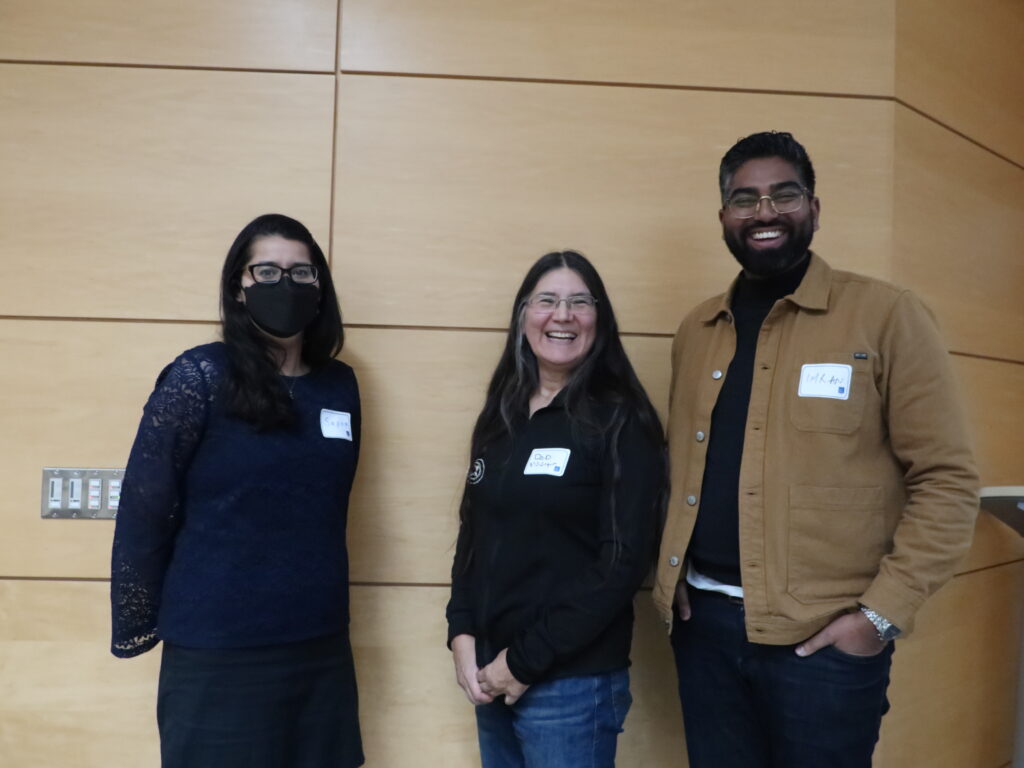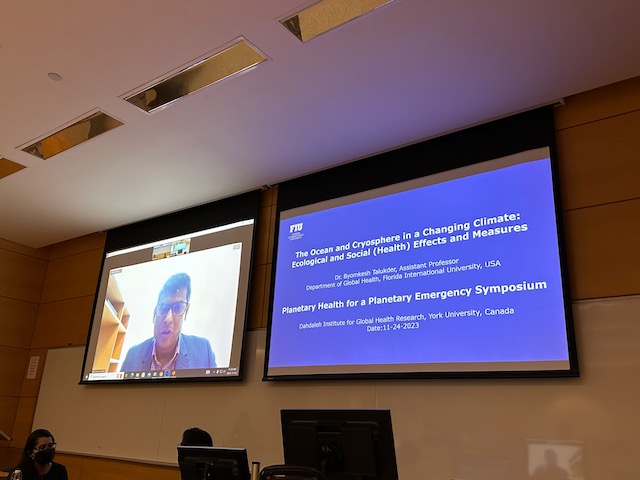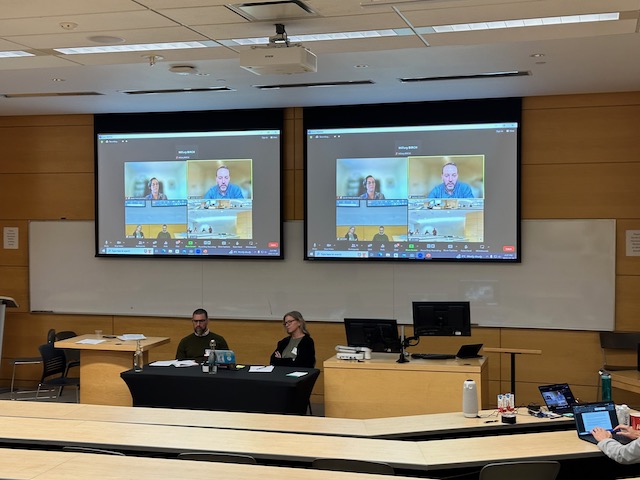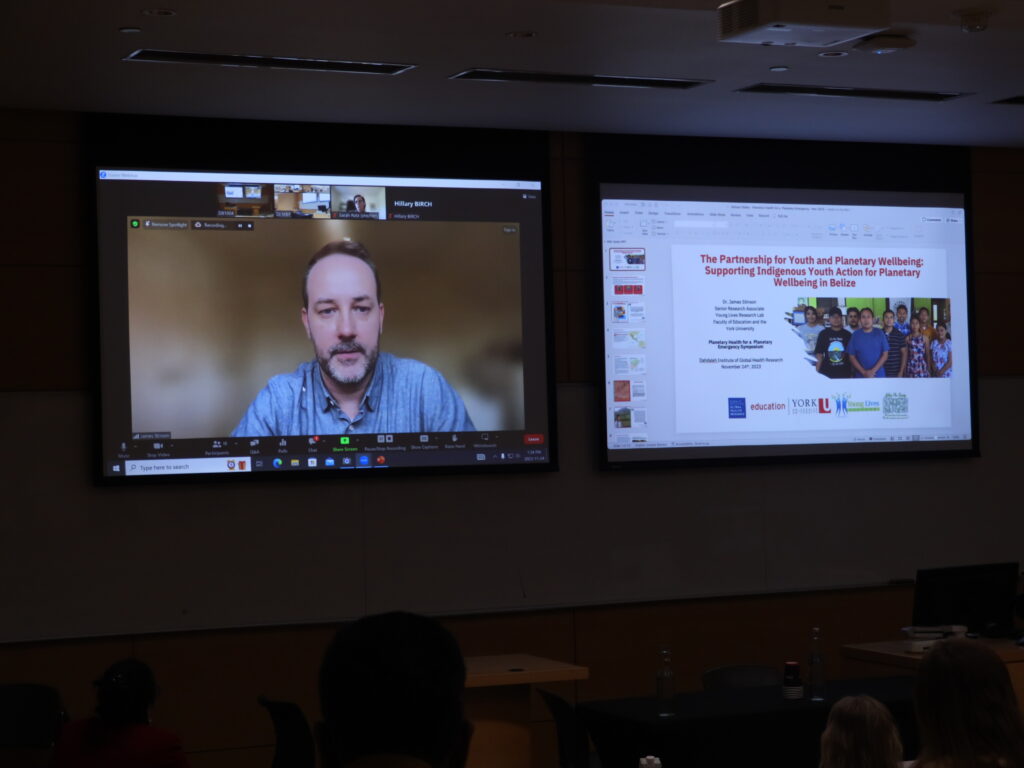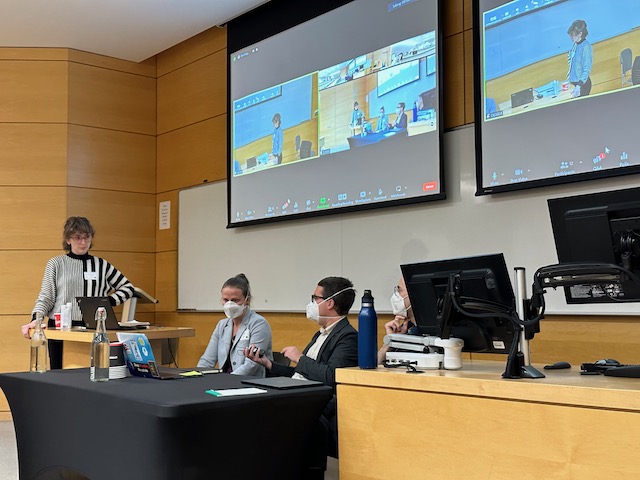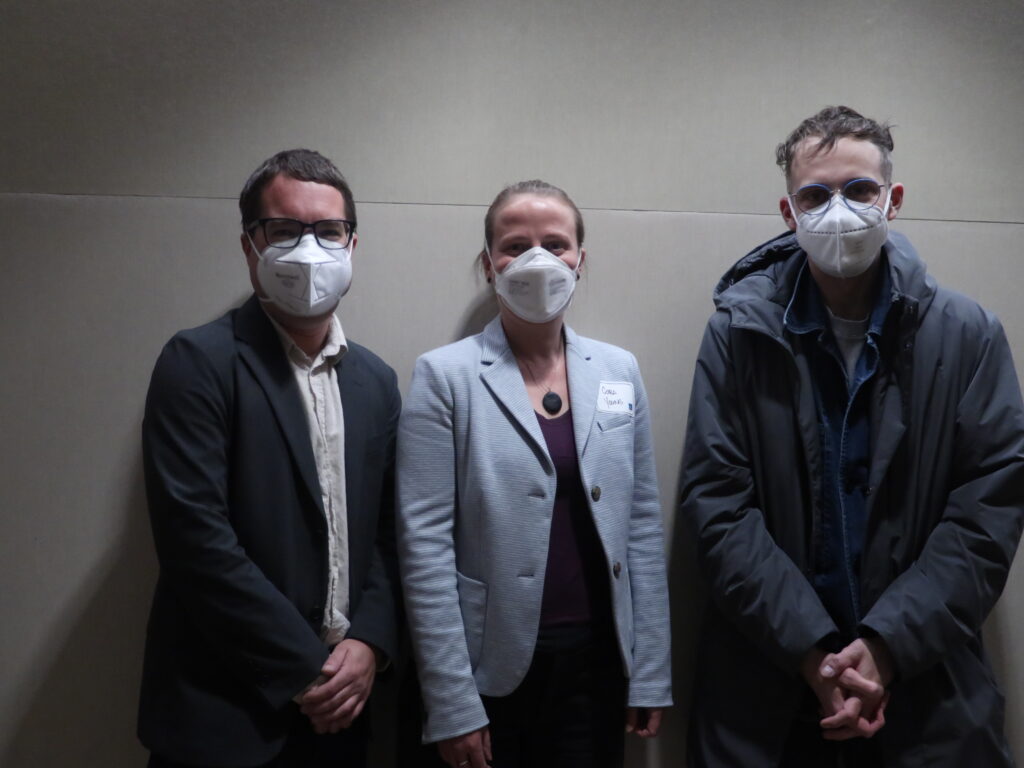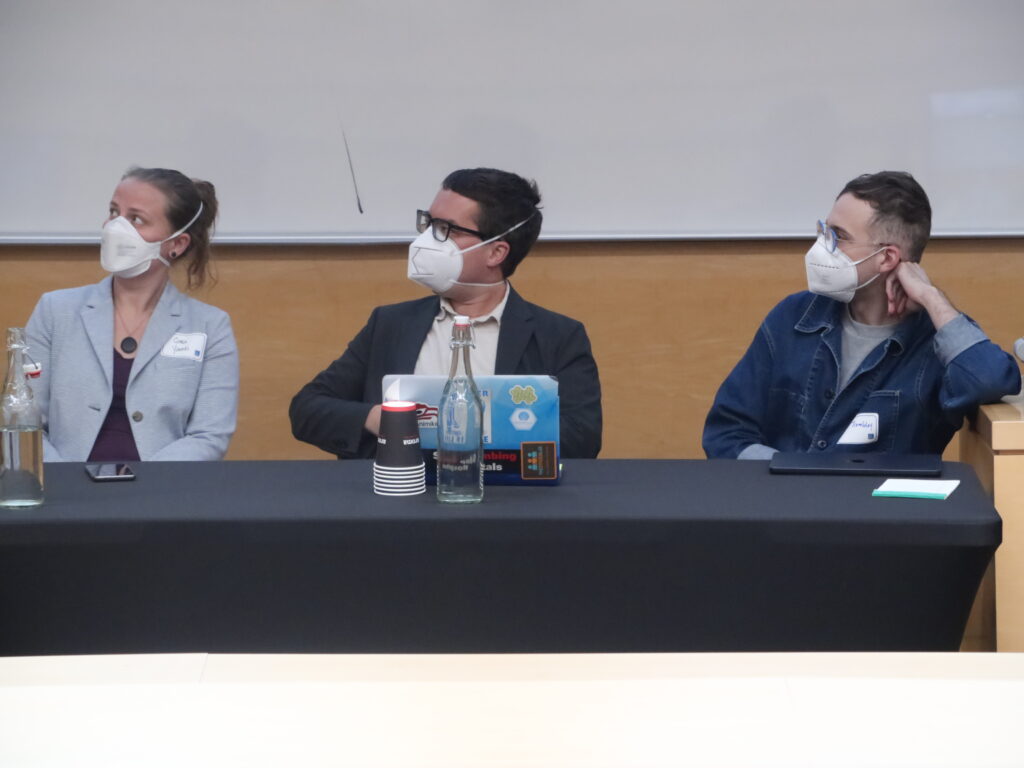Post
Published on January 19, 2024
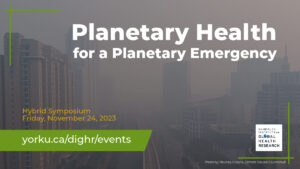
The symposium, “Planetary Health for a Planetary Emergency,” took place on November 24, 2023, at York University. This symposium brought together scholars from the Dahdaleh Institute for Global Health Research and across York University who work at the intersection of climate change and health, to discuss the potentials of planetary health as a driver of just climate action. This event launched the Dahdaleh Institute Planetary Health Research Council which supports a collaborative research community of faculty, post-doctoral fellows, and graduate students committed to planetary health research at York University and beyond.
The symposium consisted of three panels, curated around an element that is at the intersection of environmental and human health: Water, Land, and Air. Each panel included three to four speakers who presented their work related to the panel topic, followed by a moderated discussion period which included questions from the audience who attended both online and in-person.
Opening Remarks
The symposium opened with remarks from Dr. James Orbinski, the Director of the Dahdaleh Institute for Global Health Research, who highlighted the challenges of tackling global problems within existing systems and institutions that are proving il-equipped to deal with our ‘multipolar’ world. Climate change is a particularly difficult problem for the world system as it implicates global processes that result in unequal local consequences, ranging from food security to disease outbreaks. Therefore, it is urgently needed to develop new ways of relating to our biosphere, a task that is at the heart of a planetary health research agenda.
Professor Lina Brand Correa spoke as a co-Chair of the Dahdaleh Institute Planetary Health Research Council. She stressed that planetary health is not new for many Indigenous communities around the world, where it is has long been well understood that human health is connected to health of the land. In convening this event, the research council understood that new insights are only possible when we cross disciplinary boundaries, and that this symposium includes wide range of disciplines across its panels with the goal of sparking innovative ideas and collaborations in unexpected ways.
Hillary Birch, a PhD Candidate at York University, and a Dahdaleh Global Health Graduate Scholar who is also a co-Chair of the Dahdaleh Institute Planetary Health Research Council, spoke briefly before the first panel. In her remarks, she asked the audience to reflect on one question throughout their time at the symposium; how would the practice of global health look different if we moved from seeking health from a global perspective to planetary one?
Panel 1: Water
The first panel was on the topic of water at the confluence of environmental and human health, moderated by Caroline Diana Duncan, a PhD candidate in civil engineering at York University and a Dahdaleh Global Health Graduate Scholar.
Opening this panel was Dr. Imran Ali, Research Fellow in Global Health and Humanitarianism at the Dahdaleh Institute for Global Health Research. In his presentation, he offered as critique of how engineering practice renders things technical and flattens the moral and political imagination required to address the root causes of systemic problems such as access to clean drinking water. Instead, he calls for developing a way for humanitarian workers and engineers to act in solidarity with the communities they seek to assist, presenting examples of this, including from his own work with the Humanitarian Water Engineering Lab.
Professor Deborah McGregor, a Canada Research Chair in Indigenous Environmental Justice at York University, spoke next about Indigenous knowledge systems and water governance. According to Professor McGregor, any water governance that seeks to include new ways of thinking and doing must be done with the goal of helping Indigenous communities implement technical knowledge and access to science on their own terms. She raised the distinction between wise practices and best practices, where best practices are presented as checklists for implementation while wise practices involves bringing humanity, values, and biases into different ways of working with people. Implementing wise practice within water governance can only happen with readiness to work with others beyond implementing technical fixes.
Speaking next was Sapna Sharma, who is an Associate Professor in the Department of Biology and York Research Chair in Global Change Biology. In her presentation, Professor Sapna spoke about her study of ice in Northen communities where ice has long been a crucial component of the social fabric and is today under increasing pressure. Using lake ice data that has been collected for centuries, even before advent of meteorological collections, her research documents reduced freezing of lakes around the world. This has given rise to a host of interconnected socio-natural problems, including increasing evaporation, degrading water quality, changes in fish habitat, negative impacts on livelihoods, and reduction of ice safety for Northern communities.
The last speaker for this panel was Byomkesh Talukder, Assistant Professor at the Department of Global Health at Florida International University. Professor Talukder presented his research on the ocean and the cryosphere in a changing climate, specifically the impacts of rising sea levels in Bangladesh which have had major effects on coastal communities in terms of both human and environmental health. He concluded his presentation by calling attention to how interventions which seek to address the social and biological functions of water should include robust collaborations, including between the Global North and the Global South.
Panel 2: Land
This second panel focused on how land is inherently interconnected with people and the environment and how access to land and tenure rights are themselves a determinant of human and environmental health. This panel was moderated by Nilanjana Ganguli, a PhD student in Environmental Studies at York University and a Dahdaleh Global Health Graduate Scholar.
The first speaker was Dayna N. Scott, an Associate Professor in the Faculty of Environmental and Urban Change and also the Osgoode Hall Law School. Professor Scott discussed the tensions inherent in the shift to the green economy in the context of the land-back movement in Canada. Her presentation focused on the mineral deposits in the Ring of Fire in Northern Ontario. She argued that major extraction projects to support an energy transition that seek to open up new ‘frontiers’ in Canada will have to contend with Indigenous land ownership and must be committed to honouring Indigenous consent.
Next was Dr. Raphael Aguiar who recently graduated with his PhD in Health Policy and Equity from York University and was also a Dahdaleh Global Health Graduate Scholar. Dr. Aguiar’s presentation focused on the rise of anti-microbial resistance (AMR) at the confluence of human-animal-ecosystem health. Using an urban political ecology framework, he explored how processes of urbanization change human’s relations with nature and how this, in turn, shapes AMR hotspots around the world.
Dr. James Stinson, Postdoctoral Fellow in Planetary Health Education at York University, cross appointed to the Faculty of Education and the Dahdaleh Institute of Global Health Research, presented his work with Mayan youth in Southern Belize, connecting land rights struggles with community well-being. He outlined the concept of ‘Raal Cho’och’ which encompasses how land for Mayan people is conceived as not only essential for community survival in a material sense, but is linked to community identity and spirituality, making a relationship to the land reciprocal and that this conceptualization has important implications for any progress towards ‘land back’ in the context of indigenous struggles of self-determination.
The last speaker for this panel was Sarah Rotz, Assistant Professor in the Faculty of Environmental and Urban Change, who presented on issues of Indigenous food sovereignty under settler-colonial capitalism. Focusing on crown land in Ontario, specifically the Clay Belt region, she discussed how land use changes are opening new land for commercial farming where the goal is either the privatization of crown land or the bundling of land for easier access by investment firms. This has implications for land relations, including for determining what a ‘productive’ use of land is, for issues of self-determination for Indigenous peoples, and for reforestation and wildlife habitat protection.
Panel 3: Air
For the final panel of the symposium, speakers considered how air pollution disproportionately impacts low income and marginalized populations as well as the climate policy synergies of tackling air pollution that both damages health and impairs ecosystems. This panel was moderated by Hillary Birch, a PhD Student in Environmental Studies at York University, and a Dahdaleh Global Health Graduate Scholar.
First to speak was Cora Young, Associate Professor, and the Rogers Chair in Chemistry at York University. Her presentation focused on the confluence of climate and contaminates given that chemicals which move through the atmosphere can contribute to environmental and social injustice on a large scale. She discussed the Montreal Protocol which banned certain ozone destroying chemicals. Although widely successful, this protocol has resulted in new chemicals (e.g. ‘forever chemicals’) becoming prevalent as replacements. She then outlined her research of one such chemical, TFA, in both the Canadian arctic and in Toronto where her team has studied how chemical pollution has changed in order to better understand what is needed in terms of regulation now.
Next to speak was Eric Kennedy, an Associate Professor and area coordinator of the Disaster and Emergency Management program at York University. His presentation focused on wildfire management where he asked what it would mean if there was a shift in our relationship with fire, away from fire as something to be fought, towards instead learning how to accommodate fire and live in a reality where things burn. However, learning to live with fire must also account for how chronic low-grade smoke drives the majority of adverse health effects associated with wildfires and we therefore must produce new ways to ensure clean air indoors.
The last presenter was Jean-Thomas Tremblay, an Assistant Professor of Environmental Humanities at York University. His presentation focused on the ‘crisis of breathing’ as both a historical datum and a structure of experience and embodiment. This is based on an understanding of how, through breathing, we cannot fully shield ourselves from airborne toxins given that our bodies our inherently porous. He went on to provide a discussion of the uneven distribution of risk through air under racial and extractive capitalism and colonialism, where breathing becomes part of the forces that optimize certain lives while trivializing or attacking others. Examples of this include the increased pollution of our air as well as the weaponization and monetization of both air and breath.
Concluding Remarks
The symposium concluded with an informal gathering with some of the participants. Conversations centered around the insights participants had gained on quite a wide range of issues, from disciplinary perspectives they would not normally be exposed to. Furthermore, participants remarked how a planetary health perspective can bring very different disciplines together around a common theme to complement each other’s point of view, enhance our understanding of complex challenges and illuminate alternative pathways forward.
The Planetary Health research council at the Dahdaleh Institute looks forward to continuing these conversations. We hope the symposium planted the seed for interdisciplinary collaborations that will successfully germinate in the future.
Themes | Planetary Health |
Status | Active |
Related Work |
N/A
|
Updates |
N/A
|
People |
James Orbinski, Director - Active
Syed Imran Ali, Research Fellow, Global Health and Humanitarianism - Active Sapna Sharma, Faculty Fellow, Faculty of Science - Active Lina Brand Correa, Faculty Fellow, Faculty of Environmental and Urban Change - Active James Stinson, Postdoctoral Fellow, Planetary Health & Education - Active Eric Kennedy, Faculty Fellow, Faculty of Liberal Arts & Professional Studies - Active Deborah McGregor, Faculty Fellow, Osgoode Hall Law School - Active Raphael Aguiar, Dahdaleh Global Health Graduate Scholar, Global Health & Humanitarianism - Alum Hillary Birch, Dahdaleh Global Health Graduate Scholar, Faculty of Environmental and Urban Change - Active Byomkesh Talukder, Visiting Faculty Fellow - Active |
You may also be interested in...
James Madhier’s Rainmaker Enterprise Collaborating with World Food Programme
A sure sign of its impact and promise for smallholder farmers impacted by climate change, the Rainmaker Enterprise is now receiving funding and technical assistance from the World Food Programme (WFP) to help build lasting ...Read more about this Post
Internship Program: Summer 2023 In Review
This summer, the Dahdaleh Institute has worked with wonderful students through our dynamic, experiential education Global Health Internship Program. The program offers students to contribute to exciting research projects by working on literature reviews, data ...Read more about this Post
Update – Announcing the Planetary Health Advocacy "Living" Tool
As part of Carol Devine's work as Community Scholar at the Dahdaleh Institute for Global Health Research, she worked with Dahdaleh Research Assistant Yasmin Al-Sahili on a Planetary Health Advocacy literature review and created this ...Read more about this Post

